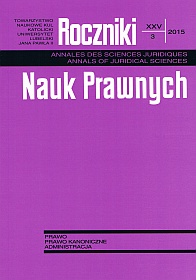Glosa do wyroku Sądu Sprawiedliwości Ontario w sprawie R. v. Wagner z dnia 12.06.2014 (R. v. Wagner, 2015 ONCJ 66)
Abstrakt
Niniejsze opracowanie omawia Wyrok Sądu Sprawiedliwości Ontario z dnia 12 czerwca 2014 r. w sprawie R. v. Wagner. Komentowane orzeczenie dotyczy prawnych ram protestów antyaborcyjnych w kanadyjskim porządku prawnym. Sąd uznał aktywistkę pro-life Mary Wagner winną naruszenia sądowych nakazów nadzoru kuratorskiego – które zakazywały jej przebywania na terenie klinik aborcyjnych w Ontario – oraz zakłócania korzystania z prywatnej nieruchomości. Oskarżona weszła do kliniki aborcyjnej w Toronto i próbowała przekonać znajdujące się tam pacjentki do zrezygnowania z aborcji, wręczając im róże i broszury. Sąd uznał, iż ani obrona konieczna (konkretnie „obrona innych”), ani stan wyższej konieczności nie wyłączają odpowiedzialności karnej Wagner. Odrzucił również twierdzenie, iż płód jest „istotą ludzką” na gruncie prawa. Stwierdził, iż przypisanie człowieczeństwa płodowi w prawie jest zadaniem normatywnym niezależnym od naukowych kategoryzacji. To skrajnie normatywistyczne założenie doprowadziło sąd do wniosku, że protest Wagner w klinice nie był próbą ochrony prawa „każdego” (everyone) do życia w myśl art. 7 Kanadyjskiej Karty Praw i Wolności. W końcu sąd przyjął, że ani zasada „rządów prawa”, ani zasada „zwierzchności Boga” wysłowione w preambule Karty nie konwalidują działań oskarżonej.
W ocenie autora komentowany wyrok jest zgodny z pozytywistycznie rozumianą literą prawa. Kwestią sporną jest to, czy pozostaje on sprawiedliwy, w zależności od przyjętej koncepcji sprawiedliwości. Glosowany wyrok przeczy jednak wymogom słuszności. Karanie więzieniem za pokojowe protesty pro-life jest poważnym naruszeniem kluczowych wartości państwa liberalnego i demokratycznego.
Bibliografia
Albert Richard: Protest, Proportionality, and the Politics of Privacy: Mediating the Tension Between the Right of Access to Abortion Clinics and Free Religious Expression in Canada and the United States, „Loyola Of Los Angeles International and Comparative Law Review” 27 (2005), nr 1, s. 1-62.
McLachlin Beverley: Unwritten Constitutional Principles: What is Going On?, http://www.fact.on.ca/judiciary/NewZeal.pdf [dostęp: 26.06.2015].
Danay Robert, Penney Jonathan: The Embarrassing Preamble? Understanding the “Supremacy of God” and The Charter, „University of British Columbia Law Review” 39 (2006), nr 2, s. 287-331
Copyright (c) 2015 Roczniki Nauk Prawnych

Utwór dostępny jest na licencji Creative Commons Uznanie autorstwa – Użycie niekomercyjne – Bez utworów zależnych 4.0 Międzynarodowe.


